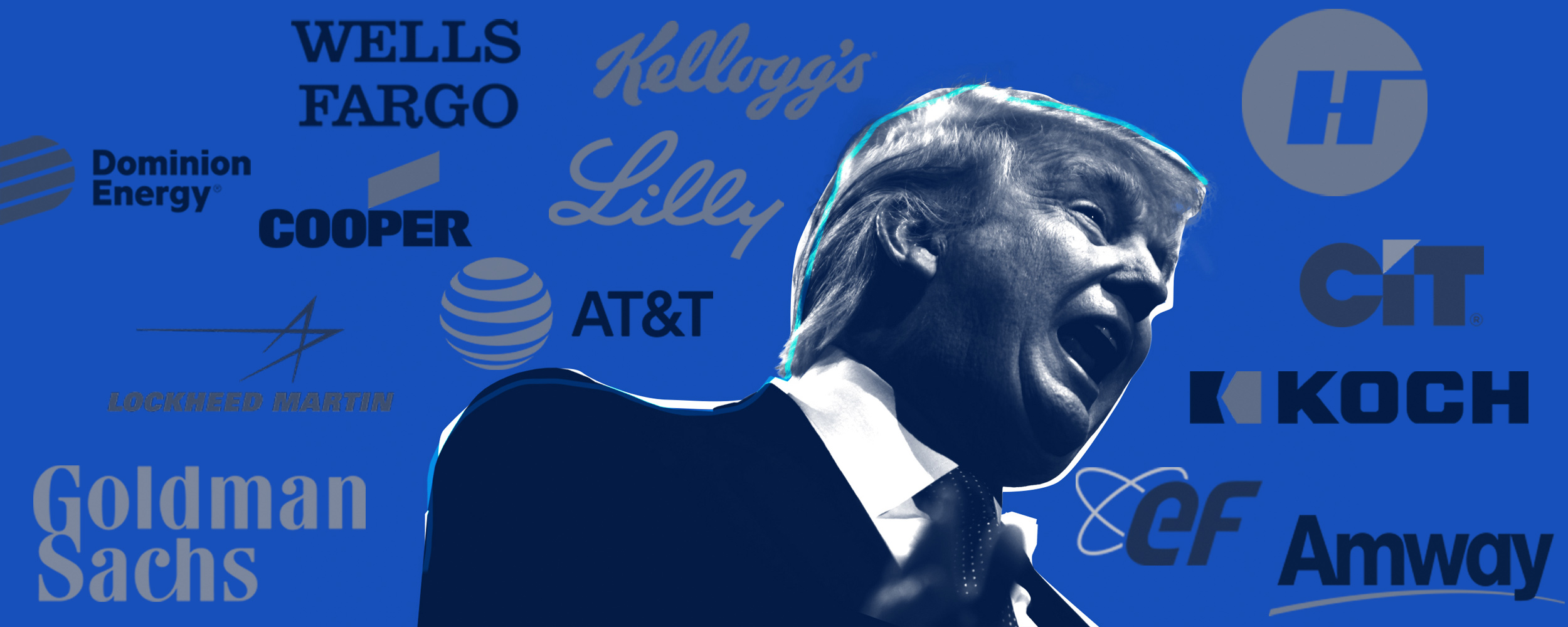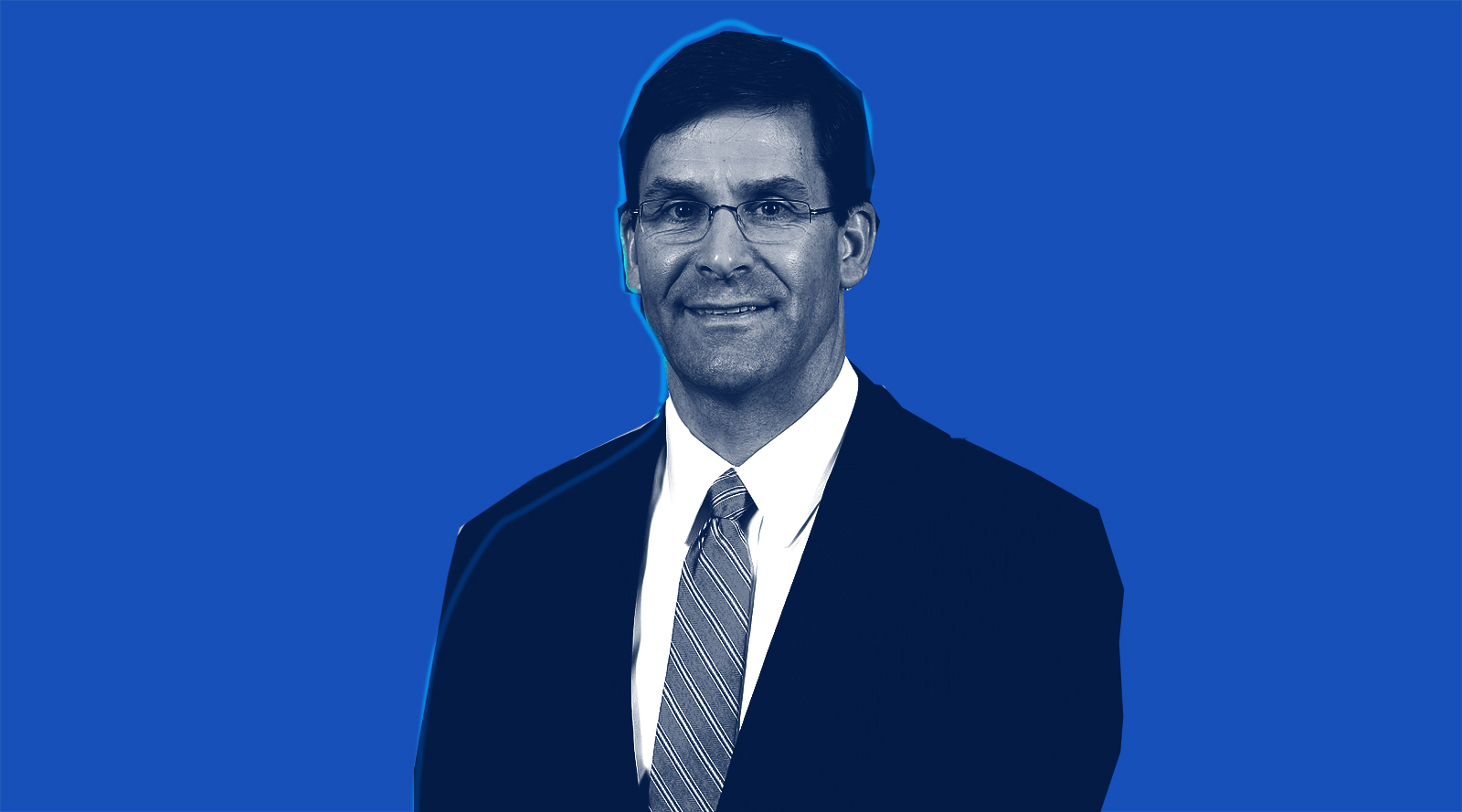
Trump’s Corporate Cabinet
How Trump turned over the U.S. government to corporate insiders
Donald Trump has installed corporate cronies in government agency after government agency, where they are working on a daily basis to undermine protections for ordinary people in favor of giveaways and rollbacks for big business.
Massive conflicts of interest are practically a job requirement for service in the Trump administration. A shipping heiress runs the Department of Transportation. An oil lobbyist runs the Interior Department. A coal lobbyist runs the Environmental Protection Agency. A pharmaceutical executive runs the Department of Health and Human Services. An investment banker runs the Treasury Department. The Defense Department has been led by a who’s who of executives from the largest defense contractors.
Since Donald Trump’s election, Public Citizen has been relentlessly documenting and decrying the wholesale corporate takeover of the American government. Trump’s initial cabinet picks as well as their subsequent replacements have drawn deeply from an extremist faction of the corporate class. When cabinet officials have left, typically due to a scandal, Trump habitually turns to industry lobbyists as replacements.
This pattern plainly reveals Trump’s cynicism and dishonesty. Once elected, Trump promptly betrayed the core claim of his campaign: that he would rid Washington of corruption, cronyism and insider dealing.
Rather than “drain the swamp” as Trump pledged, he and his corporate allies serve the interests of the corporate class and harm the American people, delivering gigantic tax cuts and reckless regulatory rollbacks that put us all at risk.
Here’s a look at the leaders of Trump’s corporate cabinet:
Vice President Mike Pence

Corporate Connections: Koch Industries, Club for Growth, Cummins Inc., Eli Lilly & Co.
During his 12 years in Congress and four as governor of Indiana, Vice President Mike Pence received eye-popping sums of money from corporate interests. He has consistently done their bidding, favoring tax cuts, government austerity and the destruction of the public sector. Pence has long been tied to Koch Industries, the giant conglomerate and its right-wing billionaire top executives Charles and David Koch.
Over the course of his political career, Pence’s campaigns received substantial funding from individuals and political action committees tied to corporate interests, including the right wing corporate group Club for Growth, the backup power generator maker Cummins Inc. (where Pence’s brother was an executive), pharmaceutical company Eli Lilly & Co, Associated Builders & Contractors and the National Association of Convenience Stores. During his run for governor, Pence raked in donations from Koch Industries and affiliated organizations, with David Koch donating $300,000 to Pence’s campaigns. The Koch-backed Americans for Prosperity also supported Pence with ads during his gubernatorial run. Americans for Prosperity also ran ads during his time as governor to support his policies.
As governor of Indiana, Pence paid for corporate tax cuts by reducing local spending and touted a privately built highway extension thanks to a partnership with Isolux Corsan, a global infrastructure company. The state ended up dissolving the project after numerous delays and construction problems.
A staunch religious conservative, Pence, supported budget items that cut funding for Planned Parenthood and limited STD testing. He also supported Indiana’s “religious freedom restoration” law, which allowed businesses to deny service to the LGBTQ community.
As vice president, Pence has kept an open door to corporate interests. According to the Center for Responsive Politics, a total of 236 lobbying clients contacted Pence’s office in 2017. This number is almost twice the 120 that approached Biden’s office in 2009.
Since Trump’s election, lobbyists in Pence’s circle are also seeing an influx of new clients. Bill Smith, Pence’s former chief of staff, registered his firm Sextons Creek as a federal lobbyist in 2017. Since then, it has signed up lobbying clients including AFLAC, AT&T, General Dynamics, Microsoft and Verizon. Victor Smith, who was once Indiana’s commerce secretary, is a principal at Bose Public Affairs Group, where he has seen an influx of clients. Similarly, Robert Grand, a friend of Pence’s since the 1980s, had not signed a new federal client since 2013, but saw a surge of new business since Trump’s election.
Attorney General William Barr

Corporate Connections: AT&T, Dominion Energy, Kirkland & Ellis, Verizon, Och-Ziff Capital Management, Caterpillar Inc.
Corporate interests, especially in the telecommunications sector, have long been able to count on Attorney General William Barr as a colleague and fierce advocate.
Barr, who was U.S. attorney general from 1991-1993 during the administration of President George H.W. Bush, has been a substantial Republican donor, giving nearly $730,000 to Republican candidates and conservative groups at the federal level since the mid-1990s, according to the Center for Responsive Politics. Barr was confirmed in February 2019, after Trump forced out his first attorney general, Jeff Sessions.
From 1994 to 2000, Barr worked as executive vice president and general counsel of phone company GTE Corp. After GTE merged with Bell Atlantic to become Verizon Communications, he worked there for eight more years.
During his time in the telecom industry, Barr and his employers convinced the Federal Communications Commission to roll back rules meant to foster competition in local phone services. The resulting regulatory structure led to the collapse of around 6,000 competing phone providers, enabling the continued dominance of incumbent phone companies such as GTE. He received a $10.4 million retirement payout when he left Verizon.
Barr was on the Time Warner Inc. board from 2009-2019. As a company director, he played a major role in the company’s merger with AT&T, announced in October 2016. After the deal’s completion in 2018, Barr received $1.7 million in income from the acquisition.
The Justice Department has unsuccessfully tried to block the AT&T-Time Warner deal, and Barr said he would recuse himself from the case. Still public interest advocates have been concerned that he could interfere with antitrust cases involving telecom mergers, which would allow the consolidation of broadband and media services.
From 2009-2019, Barr served on the board of Dominion Energy. His financial disclosure form revealed he was paid nearly $594,000 by Dominion and more than $300,000 by Time Warner from 2017 through 2018 for his board service and owned substantial amounts of company stock. Barr also was a director of Och-Ziff Capital Management, a hedge fund which paid him more than $390,000 in director fees and restricted stock over the two-year period. The hedge fund has been overseen by a DOJ-required corporate monitor since 2016 per the terms of a legal agreement resolving criminal charges of foreign corruption violations.
In his ethics agreement, Barr promised to divest his common stock in both companies within 90 days of his confirmation and recuse himself from cases that have to do with Dominion and Time Warner for one year. Dominion is the lead investor in the controversial Atlantic Coast Pipeline, the construction of which has been recently delayed due to a series of federal court challenges.
Before returning to the Justice Department for a second stint as attorney general, Barr was a highly paid corporate lawyer at Kirkland & Ellis, a law firm with close Trump administration ties.
At Kirkland & Ellis, Barr earned a salary of nearly $1.2 million in 2017 and 2018 combined, according to his financial disclosure. He was hired by construction equipment maker Caterpillar Inc., to contest an Internal Revenue Service demand for $2.3 billion in back taxes and penalties related to the company’s use of a Swiss unit to book sales and profits at tax rate as low as 4%. Caterpillar was raided by federal agents in 2017 when it was under Justice Department investigation over profits earned by the company’s Swiss parts unit. Barr argued that the investigation should be considered a civil rather than a criminal case, according to the Wall Street Journal, which reported that the company is still waiting for the results of a Justice Department review. In an ethics agreement that accompanied his financial disclosure, Barr stated that he would not “participate personally and substantially” in matters related to the firm or its clients for one year after his resignation.
Shortly after, Barr was granted an ethics waiver giving him to permission participate in the investigation of a Malaysian corruption scandal involving Goldman Sachs, a Kirkland & Ellis client.
Interior Secretary David Bernhardt

Corporate Connections: Brownstein Hyatt Farber Schreck, Halliburton, Cobalt International Energy, Samson Resources, Independent Petroleum Association of America
A true swamp monster, Interior Secretary David Bernhardt has been focused on giving corporations greater access to natural lands and public resources throughout his professional career.
Bernhardt was confirmed as Secretary of the Interior in April 2019, after working as the agency’s deputy secretary under former Interior Secretary Ryan Zinke, who resigned amid a series of scandals and investigations. As deputy secretary for the Interior Department, Bernhardt worked alongside Zinke to increase fossil fuel sales on public land and begin efforts toward deregulation.
Previously, Bernhardt was a lobbyist and lawyer with Brownstein, Hyatt, Farber Schreck LLP for nearly 15 years, representing mining, oil and other extractive industries. He lobbied on issues involving development projects and environmental issues, including implementation of the Endangered Species Act and energy and water regulations, all areas he now oversees at the Interior Department.
Bernhardt’s lobbying clients while at Brownstein Hyatt included Cobalt International Energy and Samson Resources. He also represented the Independent Petroleum Association of America and Haliburton Energy Services as legal clients. Over the course of his lobbying career, Bernhardt was paid $2.1 million by the oil and gas industry, $1.2 million by the mining industry and $1.5 million by other energy companies, according to the Center for Responsive Politics. Bernhardt also represented entities such as the Rosemont Copper open pit mine in Arizona and the Cadiz Inc. groundwater pumping project in California.
Bernhardt de-listed himself as a lobbyist in 2016 to avoid coming into conflict with Trump’s ban on lobbyists joining his administration and was nominated as deputy secretary just one year later. However, the New York Times reported that Bernhardt continued to bill for lobbying on behalf of major California agribusiness group after terminating his status as a lobbyist. A spokeswoman for Bernhardt said an invoice had been mislabeled and didn’t describe lobbying activity. The Interior Department’s inspector general’s office started an investigation into ethics complaints involving Bernhardt just four days after his confirmation.
To track his numerous conflicts of interest, Bernhardt even carried around an index card with a long list of former clients. His sympathy for industry was evident during the winter 2019 government shutdown when the Interior Department brought back 40 workers to ensure that the Trump administration’s plans for offshore oil and gas exploration could continue.
Bernhardt’s former firm, Brownstein Hyatt, currently represents Rocky Mountain Resources, a mining firm led by Chad Brownstein, son of Norman Brownstein, one of Brownstein Hyatt’s founders. This close relationship has sparked fears in Colorado that the mining firm will be able to secure approval to expand a limestone mine. “It doesn’t take a huge leap of faith to say something ain’t right here,” Glenwood Springs Mayor Jonathan Godes told Politico.
Bernhardt long represented California agribusiness interests seeking to weaken protections for fish and free up river water for agriculture. Bernhardt acknowledged in a New York Times interview that, months after joining the Interior Department in 2017, he directed a department official to weaken protections for fish in an effort to distribute more water to farmers – the same issue on which he previously lobbied.
After the story’s publication, Public Citizen filed a complaint calling on the Interior Department to investigate whether Bernhardt violated Trump’s own ethics rules requiring former lobbyists to recuse themselves from issues they had lobbied on in the two prior years.
Transportation Secretary Elaine Chao

Corporate Connections: Wells Fargo, Foremost Group, News Corp.
A
longtime Washington insider, Transportation Secretary Elaine Chao is the daughter of James Chao, founder of the Foremost Group, an international shipping firm. Her sister Angela is the company’s current chairman and CEO. This is notable because the Transportation Department oversees the U.S. Maritime Administration, which oversees all waterborne transportation, including shipping, port and vessel operations. Senate Majority Leader Mitch McConnell is her husband. Chao was Secretary of Labor under President George W. Bush from 2001 to 2009.
Prior to 1989, Chao was an executive at BankAmerica Capital Markets Group and Citicorp, and was a fellow of the corporate-backed Heritage Foundation from 1996 to 2001.
During Chao’s time leading the Labor Department, Chao was deferential to businesses that mistreated their employees. This left workers vulnerable to wage-theft violations, as cases of employers illegally underpaying their workers continued to remain unchecked.
She joined Bloomberg Philanthropies in 2012, but resigned in 2015 after the foundation told her about its plans to significantly increase investments in its “Beyond Coal” initiative.
From 2011 to 2017, Chao was a board member at Wells Fargo. The company paid her $291,000 in cash and stock in 2015. Upon confirmation as Secretary of Transportation, she continued receiving deferred stock compensation worth between $1 million and $5 million. Such compensation will continue throughout her term until 2021.
Although Chao never had a leadership role in Foremost Group, her father’s shipping company, she and McConnell have benefitted from it financially. In 2008, Chao’s father gave them between $5 million and $25 million, more than doubling McConnell’s net worth. Since then, her agency has repeatedly called to cut the budgets of programs intended to stabilize the maritime industry in the United States.
She appeared in interviews with her father, using the Department of Transportation emblem in the background while talking about his life and his business. For her first scheduled visit to China as Secretary of Transportation, Chao also made a series of unorthodox requests, the New York Times reported, asking for at least one family member to go with her and to include relatives in meetings with government officials.
The Intercept reported, based on documents from the Paradise Papers leak of offshore tax havens documents, that millions of dollars had been quietly funneled to a Chao family foundation through two offshore firms with the same names as entities in the Marshall Islands over a five-year period. Throughout all this time, Chao had also been a key voice in promoting the Trump administration’s historical rewrite of the corporate tax code, changing it so it would reward firms that funneled earnings through offshore tax havens.
As a part of her confirmation process, Chao promised to relinquish shares of the company Vulcan Materials Co., the country’s largest supplier of the crushed stone, sand and gravel used in road-paving and building. Although the initial deadline for doing so had been April 2018, she had continued holding onto them. The company’s shares had increased repeatedly whenever Chao or Trump talked about the president’s plan for a $1 trillion infrastructure package. Corporate and government filings from more than a year after April 2018 showed that she had received a more than $40,000 gain from the 13% increase in stock prices.
More than 800 pages of emails revealed that Chao had met at least 10 times with politicians or business leaders from the state of Kentucky in response to requests from McConnell’s office. Many of these people had transportation-related investments or interests and were also donors to McConnell’s campaign.
Treasury Secretary Steven Mnuchin

Corporate Connections: Goldman Sachs, CIT Group, OneWest, Dune Capital Management, Paulson & Co.
For 17 years, Treasury Secretary Steven Mnuchin worked for investment bank Goldman Sachs, eventually rising to chief information officer under CEO (and future Treasury Secretary) Henry Paulson. After leaving Goldman in 2002, Mnuchin joined the hedge fund industry. He initially worked for billionaire George Soros, then formed his own hedge fund, Dune Capital Management. Dune specialized in investing in films, including American Sniper, Gravity, Avatar and Life of Pi. Since his appointment, Mnuchin has continued to be credited as an executive producer for numerous films, including Wonder Woman, The Lego Batman Movie and CHIPS.
Mnuchin was a member of Sears Holdings’ board of directors from 2005-2016. In 2019, Sears sued Mnuchin and his college roommate, former Sears Chairman and CEO Edward Lampert, over alleged “asset stripping” during his tenure, causing its bankruptcy.
In 2008, Mnuchin led an investment group, which included Soros and other Wall Street investors, to purchase failed IndyMac bank from the federal government. Under Mnuchin’s stewardship, IndyMac was accused of being especially aggressive in foreclosing on homeowners. The bank, renamed OneWest, reportedly has paid a seven-figure settlement over alleged duplicitous practices toward its customers and signed a consent order with the federal government admitting to engaging in improper document-signing practices.
OneWest merged with CIT Group in 2015. Mnuchin stayed on briefly as a vice president and board member of CIT, but stepped down from the executive position in the spring of 2016. He resigned from his position on the board shortly after being nominated to serve as Treasury Secretary. The U.S. Department of Housing and Urban Development is investigating aspects of OneWest’s reverse-mortgage business. CIT Group, which purchased OneWest, apologized to shareholders over a $230 million shortfall in the legacy company’s bookkeeping regarding reverse mortgages and promised “to strengthen the controls and procedures.”
Published estimates on Mnuchin’s wealth vary. Bloomberg reported that Mnuchin may have received as much as $380 million in proceeds and dividends from his investment in IndyMac/One West, alone. In July 2017, Forbes estimated that his net worth was $395 million.
During his confirmation hearing, Mnuchin failed to disclose almost $100 million of his assets on Senate Finance Committee disclosure documents. He also did not mention his role as the director of Dune Capital International, an investment fund incorporated in the Cayman Islands.
In May 2017, Senate Finance Committee member Ron Wyden sent a letter to a Treasury ethics official questioning the role of Louise Linton, Mnuchin’s wife, as the interim CEO of Dune Entertainment. Treasury responded in a letter, saying Linton had been serving in an “uncompensated capacity” and had “no personal financial interest in Dune Entertainment or its related entities.” Linton resigned from the role soon after.
Trump and Mnuchin both invested in John Paulson’s hedge fund, Paulson & Co., prior to assuming their current roles. Paulson & Co. was one of several high-profile hedge funds that took up a position in preferred shares of Fannie Mae and Freddie Mac. The Trump administration has been evaluating whether to privatize Fannie and Freddie, the two mortgage finance companies that have been in federal conservatorship since September 2008. Doing so would deliver massive benefits to hedge fund investors.
Mnuchin’s use of government aircraft has come under criticism. On August 21, 2017, he and his wife traveled to Fort Knox on a government plane at the time of the solar eclipse. The Treasury Department later justified the trip by saying that Mnuchin had traveled there to talk to business leaders. ABC News reported that Mnuchin had requested a US Air Force jet to take him and his wife on their honeymoon in Europe. Such arrangements would have cost $25,000 an hour and were normally only used in extreme circumstances. As a result, Mnuchin’s request was turned down.
A report by the New York Times showed that Mnuchin had flown on military aircraft seven times from March 2017 to October 2017 at a cost of more than $800,000.For example, Mnuchin took a $43,725.50 flight to Miami for a meeting with the Mexican finance minister in June 2017. The Treasury Department’s travel office sent a note to Mnuchin’s assistant saying that a round-trip ticket on a commercial flight would have cost under $700.
The Treasury’s decision to lift sanctions on Russian oligarch Oleg Deripaska’s company in January 2019 came under extensive criticism from Democrats on Capitol Hill. Democrats have raised concerns about connections between Mnuchin and Len Blavatnik, a Ukraine-born billionaire businessman and U.S. citizen who is a major investor in Deripaska’s aluminum company Rusal and acquirer of Mnuchin’s entertainment company after Mnuchin became Treasury secretary.
At Treasury, delivering massive benefits to big corporations has been a top priority for Mnuchin. The Trump administration’s tax law, passed in late 2017, was a monstrous giveaway for the corporate class. After the law’s passage, the Treasury witnessed a 31 percent drop in corporate tax revenues, nearly double the decline predicted. So far this year, they have continued to decline as well. Experts say that corporate taxes are at the lowest level they’ve seen in 50 years. Business owners whose income operates through limited liability companies are now allowed to take 20 percent off the top of their earnings before they are taxed, which is estimated to save them $400 billion over a decade. The Trump administration claimed that its tax legislation would pay for itself, even removing Treasury Department website a 2012 study refuting Mnuchin’s claim that corporations would pass most of the savings from tax cuts to their workers. Mnuchin promised an analysis to prove the point. In the end, all Treasury published was a one-page document that a former Obama economic official called an “embarrassing joke.”
Environmental Protection Agency Administrator Andrew Wheeler

Corporate Connections: Murray Energy, Washington Coal Club, Xcel Energy, Energy Fuels Resources, Faegre Baker Daniels
A former lobbyist for a coal producer, a uranium mining firm, a utility company and a cheese maker, Wheeler became acting EPA administrator after the departure of his predecessor, the scandal-plagued Scott Pruitt. Before that, Wheeler was deputy administrator under Pruitt. This followed a nine-year lobbyist career, with clients including coal giant Murray Energy , which has numerous ties to the Trump administration. Wheeler was confirmed as EPA administrator in February 2019.
“I did work for a coal company and I’m not ashamed of the work I did for a coal company,” Wheeler told agency employees after joining the EPA.
Wheeler actually started his career at the EPA working as a special assistant in the agency’s office of pollution prevention and toxics from in the early 1990s. Wheeler then became a top aide to Sen. Jim Inhofe (R-Okla.), a notorious climate change denier, and worked on the Senate Environment and Public Works committee, then left the Senate to work as a lobbyist with B&D Consulting, which then combined with another firm to form Faegre Baker Daniels. Wheeler’s clients included Murray Energy, the Nuclear Energy Institute, Whirlpool Corp, Sargento Foods and chemical company Celanese Corp.
Another Wheeler client was Energy Fuels Resources, a Canadian uranium mining firm that pushed to scale back Bears Ears National Monument in Utah in an attempt to revive domestic uranium production. Trump eventually allowed for an 85% reduction in the monument’s size. Doing so could open more than one million acres to mining and drilling.
At his confirmation, Wheeler highlighted dozens of significant regulations that the EPA has rolled back during the last two years and made it clear to lawmakers that he fully intended to continue. Wheeler signed on an EPA proposal that would cut federal regulations on mercury emissions from power plants, a move specifically requested by Robert Murray, CEO of the coal producer that was Wheeler’s lobbying client. The changes drew upon a cost-benefit analysis that minimized numerous health effects.
Murray Energy donated $1 million to a super-PAC supporting Trump, and employees generously contributed to the campaign. Just a few months earlier, Robert Murray developed six deregulatory executive orders that would boost the coal industry. Wheeler helped to secure a meeting between Murray and former Energy Secretary Rick Perry, who was pushing a plan to bail out coal and nuclear plants using the Department of Energy’s emergency powers.
Wheeler hosted campaign fundraisers for and donated to Senators Jim Inhofe and John Barrasso in 2017, who would decide on his appointment to the EPA one year later.
Wheeler first appeared on Public Citizen’s radar in 1998, while working as a Senate committee staffer. Wheeler received free trips to Las Vegas and New Orleans for the purpose of a proposed nuclear waste disposal site and a power plant. His New Orleans stay happened to coincide with the Jazz Festival in New Orleans. He stayed at the four-star Westin Canal Place Hotel in the French Quarter, offering a heated rooftop pool, complete health club facilities and a marble bath.
On the subject of climate change, Wheeler has claimed that unclean drinking water poses a greater environmental threat than climate change, asserting that “most of the threats from climate change are 50 to 75 years out,”
Wheeler has also appointed John Christy, a climate denying scientist, to an advisory panel. “I’m skeptical of the conclusions that can be drawn from climate models,” Christy told BuzzFeed News. “I think there is a rush to judgment that every time something happens it’s because of global warming.”
Secretary of Agriculture Sonny Perdue

Corporate Connections: Big Agriculture, Houston Fertilizer
After a career as a farmer, veterinarian, agribusiness executive, state legislator and governor of Georgia, George Earvin “Sonny” Perdue was confirmed as President Trump’s the secretary of agriculture.
Before taking office, he held positions at eight different companies, including Perdue Partners, an export consulting company that Perdue founded along with his first cousin David Perdue, now a U.S. senator. Perdue’s time as governor of Georgia from 2003 to 2011 was marked by many ethics controversies involving his private businesses.
Over the course of his career, Perdue has collected donations totaling over $950,000 from the agricultural sector. Perdue collected at least $25,000 worth of gifts, including ones from tobacco company Altria and railroad company CSX.
Perdue had a net worth of $6 million and his businesses were worth $2.8 million in 2006 when he ran for governor of Georgia. When elected governor, Perdue refused to put his businesses in a blind trust.
As governor, Perdue met with state employees in the Georgia Ports Authority in Savannah to discuss the growth of Perdue’s private business. Perdue’s spokesman said that the governor was merely obtaining information that was available to any business, but state ethics law says a government official cannot engage in business with the government.
In 2005, Georgia ethics officials fined Perdue after he used an airplane owned by his family business for campaign purposes and failed to report it.
After becoming Secretary of Agriculture, Perdue has filled the office with staff members who have ties to agribusiness and taken actions that support agribusiness and harm small farmers. Kailee Tkacz, an advisor to Perdue and other U.S. Department of Agriculture (USDA) officials, is a former lobbyist for the Corn Refiners Association, a trade group that consists of the four biggest corn syrup producers in the United States. Rebeckah Adcock, who leads the deregulation team at the USDA, is a former pesticide industry lobbyist. While in office, she met with her former employer, CropLife America, the pesticide industry’s trade group.
Under Perdue, the USDA has rolled back regulations on school lunches, exempting some processed foods from meeting whole grain standards, delaying a low-sodium limit and allowing schools to serve low-fat flavored milk. These new measures are less healthy for school children but more beneficial for the processed food industry.
Perdue proposed the “America’s Harvest Box” of prepackaged food to reduce the cost and number of people on food stamps. The program would make it harder for recipients to obtain fresh food and would hurt food suppliers economically.
Purdue is also the owner of Houston Fertilizer and Grain, a company that has received $24,525 in contracts from the Department of Agriculture. Many of the company’s clients are from China, where he previously had contacts. Records show that in February 2013, Benton Global, a shipping company that Purdue invested significant money into, began taking cargo right from ports in Savannah and Brunswick.
Secretary of State Mike Pompeo

Corporate Connections: Koch Industries, Sentry International, Thayer Aerospace/H.M. Dunn Aerospace
Former CIA Director Mike Pompeo became Secretary of State after President Donald Trump fired Rex Tillerson in March 2018. A former member of the House from Kansas, Pompeo has been described as “the congressman from Koch” for his close ties to Koch Industries, the conglomerate based in Pompeo’s former congressional district.
In 1998, Pompeo founded Thayer Aerospace, an aircraft part maker, with fellow West Point alumni. The company was founded in Wichita, Kan., headquarters of Koch Industries. Wichita’s Koch Venture Capital provided had a nearly 20% interest in Thayer, according to a document uncovered by the New Yorker in a profile of Pompeo. Thayer was renamed Nex-Tech Aerospace after Pompeo sold his interest in the company. That firm was then sold to HM Dunn Aerospace.
After selling Thayer Aerospace, Pompeo became president of oil rig firm Sentry International. McClatchy reported that Pompeo failed to disclose that Sentry imported equipment from a Chinese government-owned company.
When Pompeo ran for Congress in 2010, his campaign received $80,000 from Koch Industries’ PAC and employees, more than what any candidate had ever received in a single election cycle. In 2012, Koch contributions to Pompeo’s campaign totaled $110,000. Over the course of his four congressional campaigns, Pompeo received $400,500 from Koch Industries’ corporate PAC and individual employees.
In a 2012 op-ed for Politico, entitled “Stop harassing the Koch Brothers,” Pompeo praised the billionaire brothers Charles and David Koch as “U.S. citizens, taxpayers, entrepreneurs and employers” and said Koch Industries and its employees “are among the most hardworking and generous in our community.”
As a congressman, Pompeo’s chief of staff was Mark Chenoweth, who previously worked in Koch Industries’ general counsel’s office. Pompeo also proposed legislation defunding a federal database of complaints about consumer products and an Environmental Protection Agency (EPA) registry of greenhouse-gas polluters. This legislative agenda mirrored that of Koch Industries. Pompeo has been a frequent guest at the Koch brothers’ gatherings and has called Democrats’ criticism of Koch officials “public flogging.”
Having received more than $1 million from the oil and gas industry through his political career, Pompeo consistently opposed action against climate change. Instead, he has said that climate change could be a positive, as it would create new business opportunities. “Steady reductions in sea ice are opening new passageways and new opportunities for trade,” Pompeo said, adding that, “arctic sea lanes could become the 21st century Suez and Panama Canal.”
Defense Secretary Mark Esper

Corporate Connections: Raytheon, Aerospace Industries Association, U.S. Chamber of Commerce
A veteran of the first Persian gulf war, Defense Secretary Mark Esper worked as a Republican House and Senate aide early in his career, then worked as a Pentagon official during the George W. Bush administration.
Toward the end of the Bush years, Esper left the Pentagon to work at the Aerospace Industries Association, the U.S. Chamber of Commerce and for Raytheon Co., a major defense contractor, where he worked for seven years, making more than $1.5 million in his final year.
Esper sold his Raytheon stock in early 2018 under an agreement with federal ethics officials but will be entitled to between $1 million to $5 million in deferred compensation after 2022.
In fiscal year 2018, Raytheon received $18.1 billion in defense contracts, the third largest contractor after Lockheed Martin and Boeing. In June 2019, Raytheon announced plans to combine with Connecticut-based United Technologies Crop. In May 2019, In May 2019, the U.S. State Department made cleared the $2.5 billion sale to Bahrain of the Patriot air and missile defense system.
According to Politico, Esper is a “close ally” of David Urban, Trump friend and adviser who is a lobbyist for Lockheed Martin.
In a letter to Esper, Sen. Elizabeth Warren (D.-Mass) asked him to recuse himself from all issues involving Raytheon for his entire tenure at the Defense Department. At his confirmation hearing, Warren asked Esper if he would wait four years after concluding his service in government before returning to the private sector. Esper said he would not.
Esper also refused to avoid involvement in any government business regarding Raytheon. Esper said that he may participate in meetings about Raytheon and receive information about the company “when necessary to remain informed about matters of critical importance to national security and Department of Defense programs and budget” according to a memo obtained by Bloomberg News.
Esper is the latest example of the Trump administration’s affinity for installing revolving door defense contracting officials in high positions of power. Gen. James Mattis, the administration’s first secretary of defense, served on the board of General Dynamics, a multinational military contractor. His replacement, former Acting Defense Secretary Patrick Shanahan, was a longtime top Boeing Co executive. General John Kelly, the former Secretary of Homeland Security and White House Chief of Staff was an advisor for DynCorp, a privately held military contractor.
Health and Human Services Secretary Alex Azar

Corporate Connections: Eli Lilly & Co.
A
pharmaceutical executive and former George W. Bush administration official, Health and Human Services Secretary Alex Azar was the president of pharmaceutical giant Eli Lilly and Co.’s U.S. subsidiary, Lilly USA. From 2007 to 2017, he built a personal financial portfolio worth between $9.5 and $20.6 million. In his final year there, Azar made nearly $2 million.
Azar was in charge of setting prices on a wide array of Eli Lilly and Co. pharmaceutical products. In testimony before the Senate Finance committee he emphasized that he has never lowered the price of a prescription drug. During Azar’s presidency at Lilly USA, from 2012 to 2017, the price of insulin spiked from $123 per vial to $255 per vial.
Eli Lilly has been accused in a class action lawsuit of exploiting the drug pricing system to ensure a higher profit for insulin, with some of allegedly wrongful activity taking place under Azar’s watch. The government of Mexico has also fined the company, alleging collusion related to insulin prices. In 2009, Lilly USA pleaded guilty and settled civil allegations that it had been marketing schizophrenia drug Zyprexa off-label, paying $1.4 billion in fines. As the general counsel for Health and Human Services from 2001-2005, Azar oversaw the FDA offices responsible for the investigation which led to these charges, yet he began working for Lilly in 2007.
Eli Lilly & Co. tested erectile dysfunction drug Cialis on children as a potential treatment for a muscular dystrophy condition under a process that allows pharmaceutical companies to extend their monopolies by six months if there is a potential benefit to kids. But research suggests that pharmaceutical companies take advantage of these monopoly extensions study highly profitable drugs with large adult markets rather than focus on those that are most promising for children.
Housing and Urban Development Secretary Ben Carson

Corporate Connections: Costco, Kellogg, Vaccinogen
Trump picked Ben Carson, the retired pediatric neurosurgeon and 2016 Republican presidential candidate, to run the Department of Housing and Urban Development despite his lack of professional experience in the housing field.
Carson sat on several boards of directors, including Costco, Kellogg and Vaccinogen Inc. (a Baltimore biotech company) until 2015, when he resigned from the boards soon after announcing his presidential candidacy.
During Carson’s time on Costco’s board, the board members were sued by shareholders for illegally backdating the corporation’s stock options and fraudulently inflating the stock price. Carson sold about 12,000 shares during the time in question, profiting by more than $655,000. The jury ruled in the shareholders’ favor. According to Carson’s disclosures to the Office of Government Ethics, he has received dividends from Kellogg and Costco valued at between $1 million to $5 million.
Carson pledged to step down after his confirmation to HUD from management positions at two companies : American Business Collaborative LLC, from which he drew an annual income of $600,000, and BenCan LLC, a Pittsburgh-based real estate development corporation, for which he received between $200,000 and $2 million annually
During Carson’s confirmation hearing before the Senate Banking Committee, Senators Elizabeth Warren (D-Mass.) and Sherrod Brown (D-Ohio) pressed him on whether he would prevent taxpayer money from flowing to properties owned by President Trump. Carson would not say yes or no.
Carson’s time as HUD has been controversial. In November 2017, Carson came under scrutiny for going beyond the legal $5,000 limit for redecorating. He billed HUD for a $31,000 dining set but had to cancel the order after public backlash.
Failed inspections of HUD’s multifamily properties are up by more than 30 percent since 2016, according to a NBC News investigation. Under Carson, HUD has suspended a mandate that local and state governments address segregated housing patterns as a condition of receiving HUD funding. Community groups, fair housing groups, represented by Public Citizen and several other public interest groups sued HUD, asking a court to reinstate the federal requirement.
In addition, HUD hired a former Consumer Financial Protection Bureau official despite reports that he had used racist language in blog posts from 14 years ago. “The Department of Housing should be working to address housing discrimination across the country, not serving as a dumping ground for a disgraced, racist Trump appointee,” Sen. Sherrod Brown (D.-Ohio) the top Democrat on the Senate Banking Committee, told Politico. Under Carson, HUD has retreated on investigations of housing discrimination.
Commerce Secretary Wilbur Ross

Corporate Connections: WL Ross & Co., ArcelorMittal, Bank of Cypus, EXCO Resources, Sun Bancorp., Nexeo Solutions, DSS Holdings.
Following a career of employment investing in steel, coal, fossil fuels, textiles and auto parts, Commerce Secretary Wilbur Ross was confirmed to the job in February 2017. Ross has a net worth estimated at $700 million.
Dubbed the “king of bankruptcy” and a “vulture” by critics, Rose became wealthy through the speculative activity of buying, restructuring and reselling failing businesses in the steel, coal, auto parts and textile industries. Ross’s former firm, WL Ross & Co LLC, used the bankruptcy process to offload worker benefits such as pensions and health care, reaping big profits. Today, the firm is a subsidiary of Invesco Ltd. The WL Ross name no longer appears on the company’s website.
Ross established the International Steel Group in 2002 and named himself chairman of the board. He eventually merged the company with Mittal Steel for $4.5 billion. In 2004, Ross purchased the assets of Horizon Natural Resources in a bankruptcy auction and formed the International Coal Group. He merged several separate automotive interior companies to form the International Automotive Components Group, which has an estimated revenue of $4.4 billion. Along with billionaire speculator and fellow Trump appointee Carl Icahn, Ross helped Trump salvage failing casino properties in Atlantic City, New Jersey, in the 1990s.
Ross has sat on boards of directors of ArcelorMittal (the world’s largest steel corporation), Bank of Cyprus, EXCO Resources (a fossil fuel corporation), Sun Bancorp (a bank holding company), Nexeo Solutions (a chemicals and plastics distribution corporation) and DSS Holdings (a shipping corporation).
At a coal mine in Sago, West Virginia, an explosion killed a dozen workers in 2006, a few weeks after Ross’s company took it over. His investment firm in August 2016 agreed to pay a $2.3 million fine to the U.S. Securities and Exchange Commission to settle charges that it did not properly disclose fees to investors. Ross also maintained stakes in companies co-owned by the Chinese government, a shipping firm owned by a Russian oligarch and Vladimir Putin’s son-in-law . Ross led a takeover of the Bank of Cyprus and was the bank’s vice chairman, but pushed out Russian board members.
Ross shorted stock in Navigator Holdings, a company linked to the Kremlin, five days before reports surfaced allowing him to make money on the investment when share prices began to drop. However, Ross said the short-selling was a technicality, resulting from the fact that he did not have access to the shares to deliver them to a stockbroker.
Ross also came under fire for failing to divest his investments as promised after becoming secretary, including more than $10 million worth of stock in Invesco Ltd, a large financial fim and his former employer. Ross acknowledged making “inadvertent errors in completing the divestitures required by my ethics agreement.”
Ross submitted statements to ethics officials saying he had divested shares of BankUnited Inc that he still owned at the time, according to the Center for Public Integrity. Ross said he sold the stock in October 2018 after realizing this mistake. The U.S. Office of Government Ethics declined to certify Ross’ 2018 financial disclosure reports, saying that the report, when filed “was not accurate and he was not in compliance with his ethics agreement at the time of the report.” Several of his holdings have been passed on to a family trust, raising questions about whether conflicts of interest still exist.
His firm made $214 million after selling its 12% stake in Virgin Money Holdings, a retail banking business in the United Kingdom. Ross has beena major GOP supporter, giving nearly $1 million to Republican candidates over the past 17 years.
Education Secretary Betsy DeVos

Corporate Connections: Amway, Windquest Group
The daughter of a wealthy western Michigan industrialist, Education Secretary Betsy DeVos is married to Amway heir Richard DeVos. They have an estimated net worth of more than $5 billion. Members of the DeVos family have been among the foremost funders of right-wing politicians and ideological causes since the 1970s.
Aside from extensive contributions to candidates and Republican Party committees, they have concentrated their giving to groups promoting free-market economics. Other contributions have gone to groups opposing campaign finance laws or working on social values issues, such as opposing gay marriage. DeVos’ greatest personal focus has been on education, such as seeking to expand charter schools, permitting parents to use public funds as vouchers toward private school tuition and advocating related proposals to steer funding away from traditional public schools. She has continued to advocate for policies that would benefit private education players such as for-profit colleges.
Richard DeVos is chair of the Windquest Group, an investment firm in manufacturing, technology, clean energy and other investment firms. The DeVos family has given an estimated $200 million to conservative causes, according to Mother Jones. These include gifts to the Heritage Foundation, groups operated by right-wing billionaires Charles and David Koch, and various groups hostile to campaign finance laws.
The DeVos-funded Mackinac Public Policy Center teamed with Koch brothers and the American Legislative Exchange Council in support of “right to work” legislation that was approved in Michigan in 2012.
All Children Matter, an advocacy group that DeVos founded, still owes the state of Ohio $5.3 million stemming from a fine for election law violations it was found to have committed in 2008.
The DeVoses spent $2 million in 2000 on a Michigan referendum that would have permitted students to use public funds on vouchers toward private school tuition. The proposal failed.
A group financed by DeVos successfully opposed legislation “that would have prevented failing schools from expanding or replicating.” The proposed legislation responded to a federal finding that Michigan suffered from “an unreasonably high” percentage of poorly performing charter schools.
Financial disclosures released during Richard DeVos’s failed run for governor of Michigan in 2006 revealed that the couple were investors in K12 Inc., a controversial for-profit company that operates online charter schools that have struggled with poor results. The size of this investment is unknown.
Describing her family’s extensive giving to conservative candidates and causes, Betsy DeVos wrote in 1997: “[M]y family is the largest single contributor of soft money to the national Republican party … I have decided, however, to stop taking offense at the suggestion that we are buying influence. Now, I simply concede the point. We expect to foster a conservative governing philosophy consisting of limited government and respect for traditional American virtues. We expect a return on our investment; we expect a good and honest government. Furthermore, we expect the Republican party to use the money to promote these policies, and yes, to win elections.”
In the past. DeVos had said that she had reservations about Trump “as a person.”
Veterans Affairs Secretary Robert Wilkie

Corporate Connections: CH2M HILL
A former Republican Capitol Hill staffer and Pentagon official, Wilkie replaced former VA Secretary David Shulkin, who was fired by President Trump in spring 2018. Shulkin had clashed with the White House and resisted privatization of the agency’s medical services
Wilkie started his career working for civil rights opponent Sen. Jesse Helms (R-NC), during a time when Helms’ reelection campaign launched racist attacks on his challenger. Wilkie also worked for former Sen. Trent Lott (R-Miss.), for Sen. Thom Tillis and as a National Security Council and Pentagon official under the George W. Bush and Trump administrations.
At the Pentagon, Wilkie most recently was undersecretary for personnel and readiness, where he helped develop the Trump administration’s ban on transgender service in the military, which bars openly transgender people from serving and requires troops to serve in the gender they were assigned at birth.
After Wilkie was confirmed in July 2018, CNN unearthed a 1995 speech by Wilkie, a House Republican aide at the time, lavishing praise on Jefferson Davis. Wilkie wrote that he is not an “apologist” for the South, but also said that viewing history “solely through the lens of slavery and by the slovenly standards of the present is dishonest and a disservice to our ancestors.”
Wilkie is the son of a U.S. Army artillery officer and is currently a reserve officer in the Air Force. Wilkie also was an executive at CH2M HILL, an engineering firm where he worked on the reorganization of the United Kingdom’s defense supply system as well as the 2012 London Olympics, according to his official biography.
Since he has been in office, Wilkie has battled with unions representing VA workers, refusing to sign off on a contract proposal with the union representing 11,000 VA nurses reached after more than two years of negotiations with a federal arbitrator. “We are deeply concerned that the VA has pursued anti-labor policies,” lawmakers wrote to Wilkie.
Wilkie has also worked to expand veterans’ use of non-government doctors, in line with a push by the Koch brothers-funded Concerned Veterans for America to privatize VA services. Rep. Alexandria Ocasio-Cortez (D-NY) and nursing union officials have warned against an effort to undermine the agency. Democrats have objected to a Trump administration decision to allow more veterans to go to private doctors rather than VA facilities. Under new VA rules, they are now able to do so if they live a 30-minute car ride from a VA facility or face 20 day waiting period to receive VA care. However, Wilkie denies the administration is attempting to privatize the VA, and the head of Concerned Veterans of America has described such criticisms as “scare tactics.”
Labor Secretary Eugene Scalia

Corporate Connections: U.S. Chamber of Commerce, Walmart, Boeing, MetLife, Facebook, Juul Labs
After years of defending corporations and undermining worker rights, Eugene Scalia was confirmed as Secretary of Labor in September 2019. Scalia replaced Alexander Acosta, who resigned following scrutiny over his role as a federal prosecutor in a 2008 plea deal given to sex offender Jeffrey Epstein.
The son of conservative Supreme Court justice Antonin Scalia and member of the corporate-friendly Federalist Society, Scalia is likely to use his office to continue his career of fighting crucial health, safety, and financial regulations on behalf of big business.
Scalia served as the Solicitor of Labor, the U.S. Department of Labor’s principal legal officer, during the George W. Bush administration. During his 2001 nomination process, his opposition to a Clinton administration rule that would have protected workers from repetitive stress injuries sparked concern among Senate Democrats. A fierce opponent of safety regulations, Scalia repeatedly called the ergonomics rule “unreliable science.”
As a partner in the Washington office of law firm Gibson, Dunn & Crutcher, where he earned $6.2 million in 2018, Scalia cemented his reputation as a champion of corporate interests and a successful litigator against federal regulations. A 2012 Bloomberg News profile of Scalia featured the headline “Suing the Government? Call Scalia!” Scalia listed more than 49 lobbying and law clients in his disclosure form filed with the Office of Government Ethics, including the U.S. Chamber of Commerce, Facebook, Ford, Walmart, Bank of America and Juul Labs.
Some of Scalia’s anti-labor victories during his time as a Gibson Dunn partner include helping Walmart avoid contributing to its employees’ health care in Maryland, defending Boeing from a labor union lawsuit, and arguing on behalf of insurance giant MetLife against a Dodd-Frank mandate that would have enforced greater government oversight over the company. He once even argued that SeaWorld was not liable for the death of an orca trainer who was attacked on the job, claiming that federal regulations didn’t apply to dangerous occupations like performing with killer whales, an argument that future Supreme Court Justice Brett Kavanaugh found convincing.
Another target of Scalia’s legal work was the Securities and Exchange Commission, which he successfully sued on behalf of insurance companies in a 2010 case to limit the commission’s authority to regulate certain annuities with values tied to stocks.
Scalia’s most significant victory against the federal government was against the Labor Department – the agency Scalia now leads – on behalf of the U.S. Chamber of Commerce in 2018. Scalia’s suit resulted in the rollback of an Obama administration rule requiring financial advisers to prioritize their clients’ interests above their own bottom line.
As Labor Secretary, Scalia can participate in the rewrite of the rule despite his previous private sector involvement. Scalia also argued for the Chamber against a rule prohibiting employers from discouraging workers from reporting an injury or illness in 2016.
Energy Secretary Dan Brouillette

Corporate Connections: Ford Motor Co., USAA
Bouncing between corporate lobbying positions and stints in government, Dan Brouillette, President Trump’s Secretary of Energy, has made good use of Washington’s revolving door.
Brouillette, confirmed in December 2019, has cut a lower profile than many other lobbyists who have become cabinet secretaries in the Trump administration. But Brouillette, a Louisiana native, is not apparently not embarrassed to be called a creature of Washington’s lobbying swamp. “I am who I am,” he told E&E News. “If folks refer to me as swamp creature and that means I know something about Washington, then so be it.”
Brouillette started out in D.C. as an aide to former Rep. Billy Tauzin, also of Louisiana. He worked as a lobbyist for the Fleishman-Hillard lobbying firm in the late 1990s. Under President George W. Bush, Brouillette worked for the Energy Department, serving as assistant secretary for congressional and intergovernmental affairs. After a brief stint at a lobbying firm, he then returned to Congress as chief of staff to House Energy and Commerce Committee. By 2004, he was back in the private sector, working as the top lobbyist for Ford Motor Co. before becoming the Senior Vice President of USAA, the San Antonio, Texas-based financial firm that focuses on military members. From 2013 to 2016, Brouillette served on the Louisiana State Mineral and Energy Board, which leases state land for energy exploration.
Brouillette rejoined the Department of Energy as Deputy Secretary in 2017 at the start of the Trump administration, serving under Secretary Rick Perry, who resigned in December 2019. Perry has faced scrutiny over his role in the controversy over whether President Trump pushed Ukrainian officials to investigate former Vice President Joe Biden’s son. The Associated Press reported that Perry engaged in efforts to secure an oil and gas deal from the Ukrainian government for his political allies.
Brouillette has said he worked with Ukrainian officials on nuclear energy and pipeline issues but said he has “not been involved in any of the conversations that are related to the House’s inquiry” into President Trump, which later resulted in Trump’s impeachment.
Brouillette has been supportive of many Perry’s controversial proposals, including a bailout for coal and nuclear energy plants that was rejected by the Federal Energy Regulatory Commission, claiming that subsidies for struggling coal and nuclear plants are needed to ensure the viability of the nation’s power grid. Brouillette also condemned energy regulations as a “war on coal”. On climate change, Brouillette said the issue is “something we need to work on.” He added: “Is it a serious threat? I think we can debate that. I don’t know.”
White House Chief of Staff Mark Meadows

Corporate Connections: Koch Industries, General Electric, AT&T
The fourth While House chief of staff for the Trump administration and one of Trump’s longstanding confidants, Mark Meadows replaced Mick Mulvaney in March 2020. Before that, he was a Republican member of Congress from 2013 to 2020 representing western North Carolina.
Meadows campaigned on “life, liberty, and lower taxes,” and his voting history indicates his support for big business, evidenced by his opposition to the prohibition of forced arbitration and his support of diminishing the authority of the Federal Trade Commission regarding antitrust regulations.
From 2017 to 2020, Meadows served as the Chairman for the House Freedom Caucus, the group of ultraconservative Tea Party Republicans that has often fought with party leaders. The most prominent clash between the group and the Republican presence in Congress resulted in former House Speaker John Boehner’s resignation after the Freedom Caucus put pressure on him to further advocate for the defunding of Planned Parenthood in 2015.
Members of the Freedom Caucus have often received financial contributions from Koch Industries. The libertarian ideology of the Koch brothers aligns with the efforts of the caucus, including the push to severely decrease corporate taxes in 2017. Meadows was featured at an event regarding tax reform held by Americans for Prosperity, the Kochs’ advocacy group
Meadows and other key conservatives attended a major event for Koch network donors in in 2018. According to the Center for Responsive Politics, employees and other entities tied to Koch Industries has contributed $26,000 to Meadows throughout his congressional career. Meadows is also a signatory of the Contract from America, a document containing ten agenda points presented by the Tea Party movement, notably calling for tax reform limited government, and private healthcare.
Like the Kochs, Meadows has long had a retrograde stance on environmental protection. The Freedom Caucus, under the leadership of Meadows, recommended the removal of 22 energy efficiency standards. According to a Public Citizen report, these standards were projected to save consumers over $200 billion over 30 years. Throughout his career, Meadows has received financial contributions of more than $86,000 from the oil & gas industry and more than $130,000 from the energy and natural resources sector. Between 2011 and 2012, Meadows held assets in five oil and gas companies.
In 2013, Meadows was an influential force in the government shutdown over failure to agree on federal spending Described as “architect of the brink”, Meadows wrote a letter calling for the repeal of the Obama administration’s healthcare legislation and repudiating its legitimacy, citing that it “remains broadly unpopular” and refers to its enforcement by the Internal Revenue Service as a “double-whammy.” This letter garnered conservative support and influenced Boehner to present a government plan including the defunding of the ACA. Few Democratic representatives agreed, ultimately resulting in the shutdown.
Before his congressional career, Meadows’s had a lucrative career in real estate development. He held positions in six real estate development firms, landing himself in fourteenth place on Business Insider’s list of The 19 Richest New Members of Congress in 2013. In August 2019, one of these businesses, Sound Investments, was reported to owe thousands of dollars in unpaid property taxes.
Meadows said he was not made aware of the bills and promptly paid the $62,000 owed upon discovery. Later that year, Meadows sold property to a religious organization involved in the promotion of creationism but failed to report the sale of this property and other real estate assets on his annual financial disclosure, prompting Public Citizen to request an investigation.
According to the Center for Responsive Politics, Meadows has held investments in Hewlett-Packard, Oracle Corp., Raytheon, General Electric, Intel, Trimble Navigation, Coca-Cola Company, Western Digital, LVMH, General Mills and AT&T.